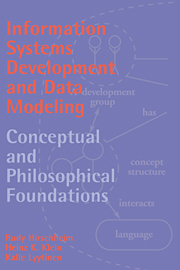Book contents
- Frontmatter
- Contents
- Preface
- Acknowledgements
- 1 Introduction
- 2 Definition and Evolution of Information Systems Development Methodologies and Data Modeling
- 3 Philosophical Foundations
- 4 Conceptual and Paradigmatic Foundations of ISD
- 5 Paradigmatic Analysis of ISD Methodologies
- 6 Conceptual and Paradigmatic Foundations of Data Modeling
- 7 Paradigmatic Analysis of Data Modeling Approaches
- 8 Conclusions
- Appendix A Summaries of Selected Methodologies
- Bibliography
- Index
4 - Conceptual and Paradigmatic Foundations of ISD
Published online by Cambridge University Press: 05 November 2011
- Frontmatter
- Contents
- Preface
- Acknowledgements
- 1 Introduction
- 2 Definition and Evolution of Information Systems Development Methodologies and Data Modeling
- 3 Philosophical Foundations
- 4 Conceptual and Paradigmatic Foundations of ISD
- 5 Paradigmatic Analysis of ISD Methodologies
- 6 Conceptual and Paradigmatic Foundations of Data Modeling
- 7 Paradigmatic Analysis of Data Modeling Approaches
- 8 Conclusions
- Appendix A Summaries of Selected Methodologies
- Bibliography
- Index
Summary
Introduction
In this chapter, the general philosophical basis laid down in chapter 3 will now be applied to provide a broad but more concrete perspective on systems development. Systems development will be explored in two steps: first, we focus on the underlying concepts; and second, we look at the application of the concepts in various methodologies. More specifically, chapter 4 elaborates on the theoretical concepts of ISD as introduced in chapter 2, and ties them into the paradigmatic notions as discussed in chapter 3. ISD tries to show how the conceptual foundations introduced thus far can actually help us to better understand, organize and analyze the rich variety of approaches which have been proposed in the literature. In chapter 5 we deepen this understanding by analyzing in detail four specific methodologies to ISD.
Our first task in this chapter is to convey a more vivid picture to the reader of how systems development might actually proceed in practice if it were to adhere to different paradigms. To this end we shall provide an idealtype description of the ‘scene’ of systems analysis under the four paradigms identified in chapter 3, thereby illustrating their underlying fundamental concepts in a systems development context. In the last part of this chapter we relate the four paradigms to the evolution of approaches to ISD as introduced in chapter 2.
Paradigms of Information Systems Development
Each of the following four descriptions of systems development was derived from interpreting pools of systems development literature which share the assumptions of a particular paradigm.
- Type
- Chapter
- Information
- Information Systems Development and Data ModelingConceptual and Philosophical Foundations, pp. 68 - 98Publisher: Cambridge University PressPrint publication year: 1995



